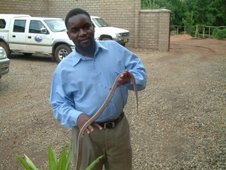
(Appeared in SADC EE News Flash Dec 2005)
Malawian Trust intensifies EE on forest fires
By Hastings Maloya
As we get to the festive season and getting into the New Year, environmentalists and concerned Malawians will remember the just ending year as the worst in relation to harmful bushfires that led to devastation of over 2000 hectares of pristine forests across the country. This included the damage to Malawi’s national tree - the Mulanje Cedar in the Mulanje Mountain Forest Reserve.
Fires, the worst seen in recent years, caused heavy damage on plants and animals in almost all protected natural forest reserves and plantations in Malawi. Among several causes, mostly the fires were caused by unsustainable means of resource utilisation like hunting where fire is used to drive animals from their hiding places. Honey harvesting has also been another cause when some harvesters use fire in their operations and carelessly leave flames that lead to uncontrolled fires. Other fires have been caused by misguided individuals whose intention is to cause damage and panic among people.
Only last year, we were excited that for the first time in many years, the Mulanje Mountain and its unique forest reserve was spared from the effects of devastating forest fires. Very few fires had occurred and we believed that this indicated peoples’ increased understanding of the importance of the reserve.
While we were about to start the success story of retaining lost biodiversity, the situation this year is not encouraging. The forest reserve, just as many parts of Malawi, has suffered serious damage.
It could be that many people have not been reached yet with messages though the continuous awareness campaigns or the targeted community was limited.
This is what has led to the Mulanje Mountain Conservation Trust (MMCT) to intensify environmental education programmes among school-going children around the Mulanje Mountain Forest Reserve, Malawi’s biggest and oldest reserve.
The Trust’s environmental education programme has been facilitating the formation and strengthening of environmental clubs in primary, secondary and tertiary institutions and coordinating out-of-class lessons in the reserve. Using a handbook “Why Forest Fires – or Do We Need Them? the programme has included teachers in the exercise. In participatory format, the school children and teachers are given an opportunity to evaluate causes and the effects of uncontrolled fires. The handbook was developed recently during an EE training programme at the SADC EE Centre in Howick and it has since proven a very powerful tool.
Serious awareness campaigns on the dangers of forest fires had mainly targeted on village-based communities. The focus now is on school-going children and out-of-school youths. It is anticipated that when the youths are made aware of the dangers of fire while in school, they will ably pass on the message to the community that they live in and the will to fight for their environment shall remain in them.
The youths, full of zeal and energy, have since set up monitoring programmes and will soon be trained in basic fire-fighting techniques ready to take part in putting of fire in case it starts.
Malawi, just as many countries in the world, is today facing a lot of environmental problems and challenges, which include water and air pollution, soil erosion, deforestation and loss of biological diversity. Fire has been noted, to a certain extent as being the main source and cause to these problems. This has also led to loss of some plant species that could not stand the heat caused by fires. This leads to environmental degradation where the links and relationships between natural resources and people are affected in one way or another.
Mulanje Mountain, central Africa's highest mountain, is home to rare species of trees and animals. The Mulanje cedar, Malawi's national tree, is found nowhere else in the world, making the mountain one of the country's famous tourist destinations. Mulanje Cedar was declared Malawi's national tree by the country's founding president Hastings Kamuzu Banda in 1984 but Mulanje Mountain has been a protected area since 1927, making it the country's oldest forest reserve.








1 comment:
I read your article and found it very interesting. I have worked in wildland fire management in the western United States for many years. Fire can be a useful tool in the forest but it can also be very destructive, as you have noted
Post a Comment